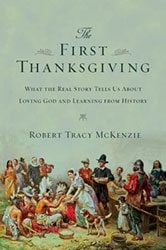 Robert Tracy McKenzie does a masterful job of liberating the pilgrims from the cultural and economic myths that often disguise their faith and practices in his new book The First Thanksgiving. He sees them as God-centered people, leery of religious holidays, and focused on covenant with God and one another. The pilgrims were inspired by the necessity of caring for each other; their faith and economics were a far cry from today’s individualistic capitalism and religious life. Covenant means that we need each other and that within the fabric of life, the well-being of one supports the well-being of all, and healthy communities support healthy, God-fearing individuals. Their image of freedom centered on our liberty to worship God in the scriptural spirit rather than the choice to do as we please or live without corporate limitations.
Robert Tracy McKenzie does a masterful job of liberating the pilgrims from the cultural and economic myths that often disguise their faith and practices in his new book The First Thanksgiving. He sees them as God-centered people, leery of religious holidays, and focused on covenant with God and one another. The pilgrims were inspired by the necessity of caring for each other; their faith and economics were a far cry from today’s individualistic capitalism and religious life. Covenant means that we need each other and that within the fabric of life, the well-being of one supports the well-being of all, and healthy communities support healthy, God-fearing individuals. Their image of freedom centered on our liberty to worship God in the scriptural spirit rather than the choice to do as we please or live without corporate limitations.
Beyond the cultural myths, McKenzie’s First Thanksgiving roots the pilgrim’s perseverance in their trust in God’s covenantal relationship with them and all creation. Divine providence was at the heart of their faith. They truly believed that God moved through history, guided by God’s vision, and that the events of life reflected God’s good pleasure. Despite their affirmation of a strong form of divine providence, McKenzie notes that they resisted the temptation to identify any particular event (such as a hurricane or a particular success) with the specific working out of God’s providence. God’s great faithfulness included the scope of history and, by implication, every event in history. But, we mortals would do well not to see any event in isolation as a reflection of God’s will. God’s aim for human and cosmic history is good and even apparently contrary events are part of the divine fabric of history and cosmology. The outcomes of historical process are for God’s glory not our comfort.
The pilgrims were sustained by the faith that God was at work in the large and the small, the global and the personal. God is the energetic will determining all things. McKenzie’s interpretation of the pilgrims’ understanding of God’s will as determining all things raises the question, “Can we be patient with history and trust God’s providence while also affirming randomness and creaturely creativity as causes of the events of our lives? Can we affirm a gentle providence working in all things in a relational rather than all-determining manner? Is creaturely creativity, albeit shaped by God’s vision, consistent with divine providence?”
The pilgrims clearly identified God’s sovereignty with the events of history. On our own, we can do nothing; we are tainted by sin; and prone to alienation. The more power God has the more certain we can be of our own standing in the world. The less power we have in relationship to divine sovereignty, the better off we are spiritually and corporately.
Recent theological movements, such as process theology, see the divine-human relationship as collaborative in nature. Divine sovereignty orients each moment of experience while leaving room for creaturely initiative. Our use of power, though shaped by God’s influence, can expand or impede God’s movements in our world. God, from the point of view of process-relational theology, works with creaturely freedom, both shaping and adapting to it; God intimately responds to our prayers and actions in such a way that what we do influences the course of divine activity.
The question, of course, is “Is a relational, collaborative God, powerful enough to sustain our faith in difficult times?” The pilgrims believed that all times – and our times – are in God’s hands. They were sure that divine providence steered the course of history and our personal lives, regardless of appearances. Our well-being was secondary and ultimately of modest consequence in contrast to God’s sovereign glory. More contemporary theologies, such as process theology, connect divine and creaturely well-being. Our lives contribute to God’s experience in ways that bring beauty or ugliness to God’s experience. Moreover no one specific event is entirely God’s will nor is the course of history pre-ordained in a particular direction. While God aims at beauty of experience, there is no final and absolute model of beauty to be attained. Beauty, in its many forms, emerges in the process. There is no guarantee to that God’s will be done fully in history, although God is constantly at work in history.
Shared divine-creaturely power does not rob God of power. God’s power is at work in and through things, cooperating with and bringing the best out of every situation. God shapes the wide panorama of the universe as the details unfold in the interaction of many interdependent causes. We cannot be certain of a particular outcome but we can trust that God will continue to seek the best for us and all creation, regardless of what we have done in the past or will do in the future. Sovereignty, if we use the term at all to describe God’s relationship with the world, is more about empowerment than control, artistry than order, and adventure than outcome. God’s good pleasure is always relational and never coercive. Accordingly, although we must be agnostic about the outcome of history, we can be confident that God will always be at work in our lives and the historical process. God always has the resilience and energy to respond to every situation, providing healing possibilities for even the most challenging situations.
For more on The First Thanksgiving – including an author video on the “real” first Thanksgiving dinner – visit the Patheos Book Club here.













